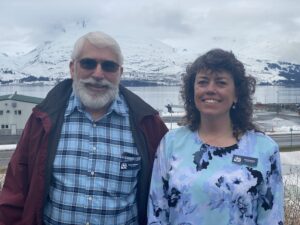
By Robert Archibald, President, and Donna Schantz, Executive Director
The Council’s mandates were created after the Exxon Valdez oil spill: prevent the return of the complacency that led to that disaster; advocate for oil spill prevention and strong response capabilities in case prevention measures fail; minimize environmental impacts of terminal facilities and associated tankers; and promote partnerships that build trust between citizens, industry, and regulators. Our volunteers and staff log countless hours toward these goals.
While the Council continues to carry out its work, we are facing escalating threats to many safety measures enacted in direct response to lessons learned. This includes a significant diminishment of staffing and resources at most of the regulatory agencies that oversee safety for the terminal.
We continue to follow up on issues covered by our 2023 report, “Assessment of Risks and Safety Culture at Alyeska’s Valdez Marine Terminal,” by Billie Pirner Garde. That report noted these reductions, among other safety concerns. The subsequent report from the Government Accountability Office, released in 2025, warrants additional scrutiny and advocacy.
More details on these reports: GAO report looks at Joint Pipeline Office
Our concerns in these areas are only increasing as cuts to personnel, resources, and budgets have escalated at both the federal and state level. We are concerned whether critical safety oversight is adequate to prevent another catastrophic accident and devastating oil spill. We are concerned that the complacency that played a part in the spill is returning.
In addition, Alyeska has announced a reorganization that will reduce its workforce by 60 positions system-wide, or 8%, by January 2026. A reduction in staffing is concerning on many levels, including that Alyeska deferred development of a human factors program that was planned in response to our 2023 report noted earlier, citing a lack of staffing and resources.
Studies have shown that business reorganizations and staffing reductions have been directly linked to an increased risk of accidents and negative health outcomes for employees across all industries. This results from psychological strain on employees, loss of expertise, and operational changes that compromise safety protocols. It is unclear how Alyeska’s reorganization will impact workloads including development of their pending human factors program during a time when the risk of human-caused accidents could rise.
After years of advocating for increased staffing and resources for the agencies that oversee safety for oil spill prevention and response systems, we are now faced with these agencies being asked to do more with even less. This combination seems to be setting the stage for a dangerous path at a time when oil production is expanding in Alaska.
The Council is a voice for citizens – those who have the most to lose from a major oil spill. We provide those in our region with a platform to stand up for safety and push back on complacency at the highest levels. While we strive to understand the impacts of all these changes, we must remember why we were created: to hold the line to maintain the safest spill prevention and response system possible.